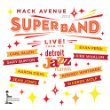It all started with a New Yorker article written by a guy who normally contributes humorous pieces to The Onion. The writer, Django Gold, wrote a satirical article titled “Sonny Rollins: In His Own Words.” Gold’s Rollins trashes the music that made the legendary tenor saxophonist famous and pretty much states that his Rollins believes that he wasted 60 years of his life.
At this point, I kind of feel the need to note that The New Yorker and jazz music have a lot in common. The New Yorker also has a following among the elite class and the quality of the magazine’s work – mainly long form journalism – is excellent. But here’s the flip side. Most people come across copies of The New Yorker during the visit to the doctor or dentist where it sits on a table right along with old issues ofSports Illustrated, People and Entertainment Weekly. And if the person picks up a magazine, it will probably be one of the other three. Truth be told, the person’s more likely to be using a smart phone or tablet to read stuff on Buzzfeed. That’s because the magazine industry – like jazz – has seen better days.
Moyer’s argument that jazz genre has become too elastic for its own good does have merit. However, the Superband’s willingness to expand the jazz standard canon by reimagining Donnie McClurkin’s “Speak To My Heart” pays dividends. The band’s rendition refutes several of Moyer’s criticisms as if they anticipated them more than a year in advance. The tune does not suffer by being performed as an instrumental. In fact, this allows listeners to appreciate the conversational interplay between and among the musicians. The solos do not come across as pretentious, as each player knows when to cede the spotlight to the other players. As creative as the musicians get on their take on McClurkin’s classic, they never stray so far that they can’t return to the basic melody, thanks in large part to the sturdy undergirding provided by Whitaker and Allen.
Today’s players have a refreshing willingness to add their original voices and tunes to the jazz conversation. This edition of Live From the Detroit Jazz Festival includes several originals including Dielh’s lush and expressive piano playing on “Blue Nude” and the mid-tempo swing of Jones’ “Of Mars and Venus.”
The album could have benefitted from the presence of a vocalist such as the fabulous Ceclie McLorin Salvant. Her performance brought some additional fun to the 2012 show. Still, Live From the Detroit Jazz Festival shows that jazz has plenty of artists who will ensure that those waiting for jazz’s demise will have to wait quite a bit longer. Recommended.
By Howard Dukes

